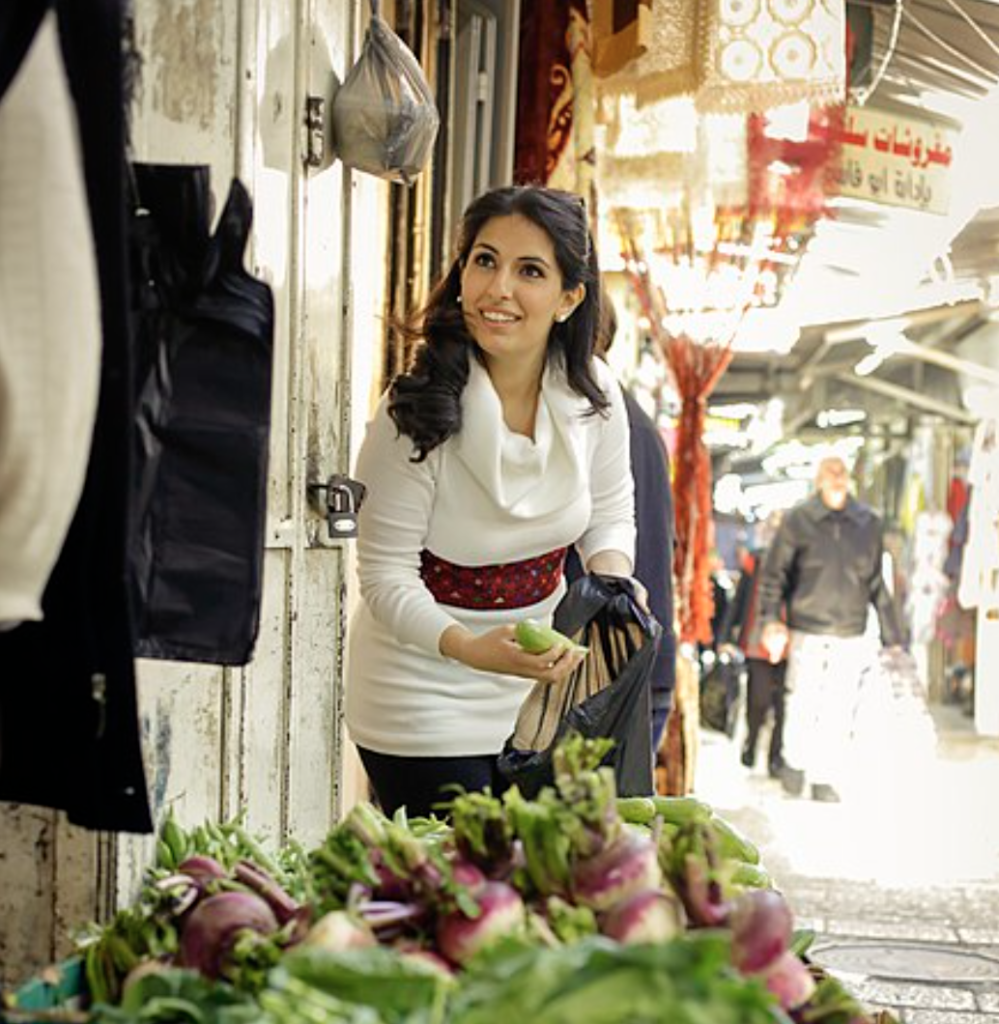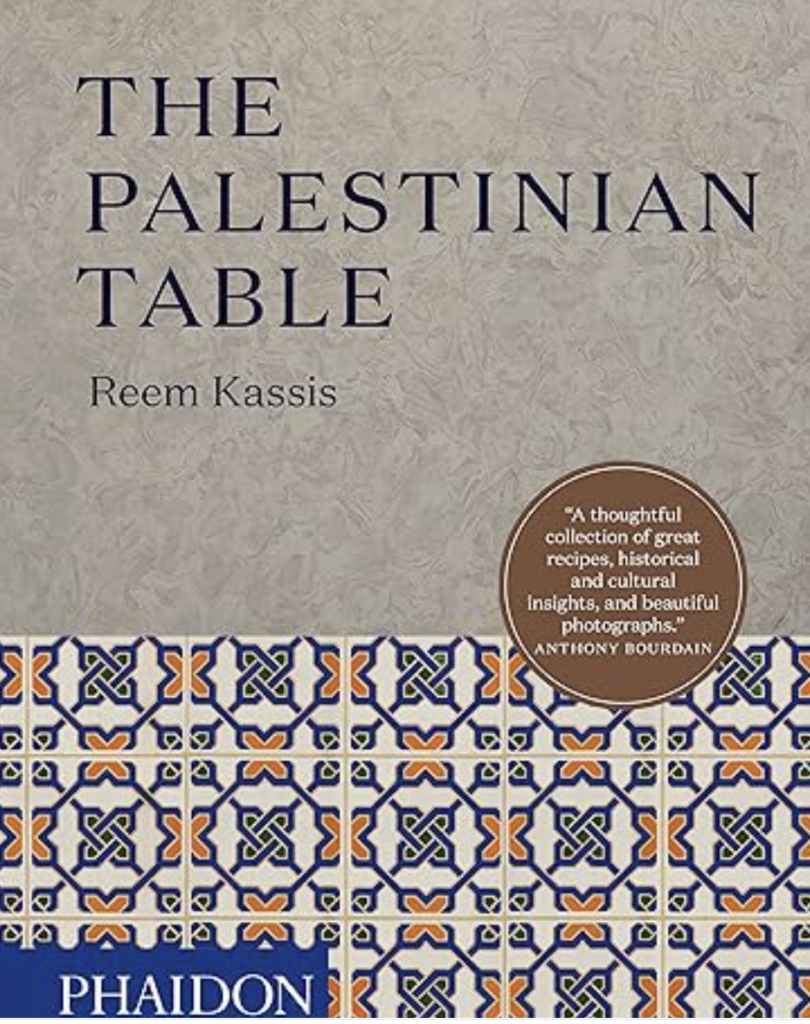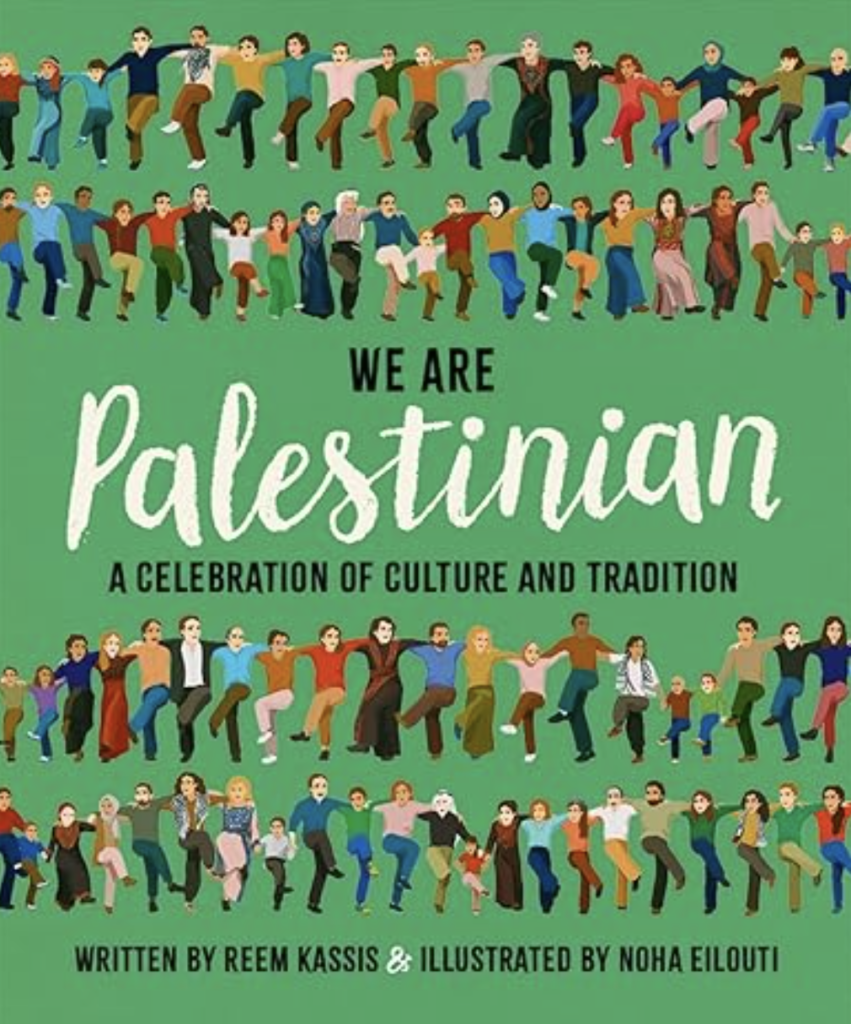Pathbreakers of Arab America—Reem Kassis

By: John Mason / Arab America Contributing Writer
This is the fifty-eighth of Arab America’s series on American pathbreakers of Arab descent. The series includes personalities from entertainment, business, sports, science, academia, journalism, and politics, among other areas. Our fifty-eighth pathbreaker is Reem Kassis, a Palestinian American born in Jerusalem to a Muslim mother and Christian father. While initially a businesswoman, Reems became a writer and cookbook author. Her work focuses on the intersection of food with culture, history, and politics. Reem’s latest writing focuses on the place of Palestinian cuisine in the context of the Arab-Israeli conflict and, more specifically, the Gaza war.
Having mastered the business world, Reem Kassis turned her passion to Palestinian cuisine
Having mastered the business world, Reem Kassis turned her passion to Palestinian cuisine.
Reem was born in Jerusalem in 1987 to a Palestinian Christian father from the Galilee and a Palestinian Muslim mother from Jaljulya. She holds Israeli citizenship. Probably realizing that her fate lay outside of occupied Palestine, Kassis left Jerusalem at 17 to attend the University of Pennsylvania in Philadelphia, where she earned her undergraduate degrees in business and international studies at the Huntsman Program. The Wikipedia series on Arab America tells us Reem earned her MBA from the Wharton School in 2010 and studied further at the London School of Economics, obtaining an MSc in social psychology.
After graduating, Reem worked as a business consultant at McKinsey & Company. She also worked with the World Economic Forum and in executive search. Once she had given birth to her daughters, she decided to leave the business world and pursue a writing career. She quickly became a recognized writer in that career, first publishing “The Palestinian Table.” The book was published in 2017 and nominated for a James Beard Award, one of the most recognized culinary literary prizes. It was also selected as one of NPRs best books of 2017. Reem’s second book, “The Arabesque Table,” was published in 2022 and was hailed as one of the best cookbooks of the year by numerous outlets.
Further accolades for the book came from a journalist in the Institute for Palestinian Studies, who described Kassis as “a humble guide who doesn’t dazzle with intimidating recipes.” Some of the highest praise came from the late chef Anthony Bourdain, who praised the book, saying, “With ‘The Palestinian Table,’ Reem Kassis gracefully demonstrates the power of food to transcend the political divisions that are, too often, all we know of a place like Palestine. Reading and cooking from this essential book – a thoughtful collection of great recipes, historical and cultural insights, and beautiful photographs – will move you closer to understanding this complex, fascinating part of the world.”

“The Arabesque Table” takes a broader look at contemporary cooking from across the Arab world, tracing the region’s evolving and cross-cultural food and showcasing its impact on global cooking today. One review states, “The Arabesque Table sees food, recipes, and stories as part of the ongoing conversation (and feast!) between cultures and their cuisines.”
Kassis has branched out beyond the purely culinary realm to author a nonfiction book celebrating everything Palestinian. “We Are Palestinian” moves from culture and food to music and literature. The book celebrates Palestinian heritage through “wonderful anecdotes, fascinating facts, and memorable quotes.” It is beautifully illustrated by Noha Eilouti, an emerging Palestinian-Canadian illustrator.
Kassis delves into the politicization of Palestine through the medium of food and cuisine
Reem has recently entered a new realm of food analysis through a critique of Israelis’ coopting Palestinian cuisine as its own. She wrote about this topic in a Washington Post article titled, “Here’s why Palestinians object to the term ‘Israeli food’: It erases us from history.” She relates how when she packed for her trip to Philadelphia for her education, her mom added all sorts of jars of food: freekeh, sumac, za’atar, and more. I said, “What, you think there’s no food in America?”
While feeling homesick in her new home, Reem’s friends took her to a newly opened Israeli restaurant. “Its menu rotated around the dishes of my youth: hummus, tabbouleh, and freekeh (the green wheat my family would spend days every spring picking, sorting, and smoking). I was comforted to eat freekeh, which tasted exactly like my mother’s. But I was also frustrated to see the best Palestinian dish I had tasted since arriving in the United States being served at an Israeli restaurant — with no mention given to its origin, nor the origin of most other dishes on the menu, many of which I recognized as the iconic meals of my childhood.”
As it is for many Palestinians, Reem continued, “The term ‘Israeli cuisine’ is hard for me to swallow. It’s not that I am opposed to the idea or can’t tolerate cultural diversity and fusion. On the contrary, I know full well that our Palestinian cuisine, like every other, is a byproduct of evolution and diffusion. The concept of national cuisine is a relatively recent construct, appearing in the late 18th and early 19th centuries following the rise of the nation-state.”
Kassis feels, however, that the Israeli borrowing of Palestinian cuisine is “cultural appropriation, …which relies on exploitation and consequent erasure, followed by the willful denying of those actions. Food, after all, is an expression of history, culture, and tradition. By this token, presenting dishes of Palestinian provenance as ‘Israeli’ not only denies the Palestinian contribution to Israeli cuisine, but it erases our very history and existence.”

Kassis had an even more extreme reaction to the place of Palestinian cuisine in politics compared to her earlier days at Penn. In an article she wrote for The Atlantic, titled “They Ate at My Table, Then Ignored My People,” she noted, “Over the past several years, Palestinian food has risen in both popularity and acceptance in the U.S. I have continued to welcome more and more people to my family’s dining table, a generosity inherent to Palestinian culture. Then came the October 7 Hamas attack on Israel…” Reem noted, “At this point, I saw how many people were content to savor our food while ignoring my people.”
When it came to marches and protests against the killing and starvation of civilians in Gaza, Reem averred, “Others who had once relished my hospitality and cooking and had been vocal advocates for the rights of women, immigrants, or Ukrainians—whether on social media, in street protests, or at the ballot box—were now conspicuously silent.”
Kassis was disappointed over the absence of a response by her Jewish friends to her generosity. She complained, “I had hoped that sharing my food and culture could juxtapose two things for my guests: the vibrancy and humanity of my people as expressed through a rich culinary tradition and the reality of the ongoing suffering they see on the news. I assumed that witnessing those two extremes—a duality Palestinians have lived with for decades—would foster empathy, at least in times of crisis. In so many cases, that hasn’t happened.”
Reem maintains that her communal dining table “has become more than just a symbol of Palestinian hospitality. It is certainly not a place where I will self-censor any longer. Recognizing my humanity and that of my people is the precursor to us dining together. That doesn’t mean we must agree on how to resolve the conflict. Still, it does require sharing some fundamental truths: that Palestinians have a right to self-determination and equality in our ancestral land and that the ongoing loss of our homes and loved ones is a tragedy that needs to end. Today, each meal at my table is a testament to Palestinian perseverance in the face of such tragedies. It is also a declaration that our culture, and our existence, cannot be extinguished.”
Will we ever again not think twice when eating our next kefta?!?
Sources:
–“Reem Kassis,” Wikipedia Series on Arab Americans, 2024
–“The Palestinian Table,” Reem Kassis, Phaidon Press, 2017
–“The Arabesque Table,” Reem Kassis, Phaidon Press, 2021
–“We are Palestinian,” Reem Kassis, a non-fiction children’s book celebrating everything Palestinian, 2023
–“Here’s why Palestinians object to the term ‘Israeli food’: It erases us from history,” Perspective by Reem Kassis, The Washington Post, 2/18/2020
–“They Ate at My Table, Then Ignored My People,” Reem Kassis, MSN/Atlantic Magazine (following the 10/7 Hamas attack)
John Mason, Ph.D., focuses on Arab culture, society, and history and is the author of LEFT-HANDED IN AN ISLAMIC WORLD: An Anthropologist’s Journey into the Middle East, New Academia Publishing, 2017. He has taught at the University of Libya, Benghazi, Rennselaer Polytechnic Institute in New York, and the American University in Cairo; John served with the United Nations in Tripoli, Libya, and consulted extensively on socioeconomic and political development for USAID and the World Bank in 65 countries.
The views and opinions expressed in this article are those of the author and do not necessarily reflect the position of Arab America. The reproduction of this article is permissible with proper credit to Arab America and the author.
Check out our Blog here!








